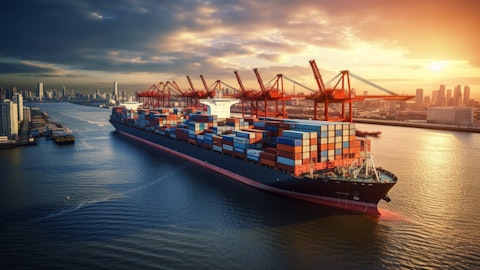Gold Royalty Corp. (AMEX:GROY) Q3 2024 Earnings Call Transcript November 5, 2024
Operator: Welcome to the Gold Royalty Corp. Third Quarter 2024 Results Conference Call. All participants will be in listen-only mode. [Operator Instructions] Please note this event is being recorded. I would now like to turn the conference over to David Garofalo, Chairman and CEO. Please go ahead.
David Garofalo: Thank you, operator. Good morning, ladies and gentlemen, thank you for participating in today’s call to review our third quarter 2024 results. Please note for those not currently on the webcast, a presentation accompanying this conference call is available on the Presentations page of our website in PDF format. Some of the commentary on today’s call will include forward-looking statements and I will direct everyone to review Slide 2 of the presentation, which includes important cautionary notes. Speaking alongside me on today’s call will be Andrew Gubbels, Chief Financial Officer; and Jackie Przybylowski, Vice President, Capital Markets. The third quarter of 2024 marks an important inflection point for the company.
Our outlook continues to grow increasingly positive with the ramp up in construction of several key assets across our portfolio. We achieved record revenues for the nine months ending September 30, 2024 and have reiterated our full year guidance for expected total revenue, land agreement proceeds and interest of $13 million to $14 million. We continue to be excited about the outlook for 2025 as well, with more cash flowing assets, strong commodity prices and our stable cost structure expected to translate to growing revenues and cash flows next year. With that, I will pass the call over to Andrew Gubbels to discuss the details of our third quarter results on Slide 4.
Andrew Gubbels: Thank you, David, and good morning everyone. We had strong financial performance during the quarter with Total Revenue, Land Agreement Proceeds and Interest of $2.6 million, a 90% increase relative to the third quarter of 2023, and we maintained stable cash operating expenses of below $2 million for the quarter. On a year-to-date basis, we have achieved a record $9 million in Total Revenue, Land Agreement Proceeds and Interest, an over 130% increase relative to the comparable period in 2023 and against year-to-date cash operating expenses of $5.9 million. As a result, we’re on track to deliver our first year of positive cash flow from operations with $1.3 million of cash provided by operating activities year-to-date, which excludes $1.5 million of land agreement proceeds credited against mineral properties.
We also reported positive net income in the quarter after recognizing a $5.9 million non-cash deferred tax asset following an internal reorganization of the Company’s subsidiaries. By amalgamating certain previously acquired entities, each of which pay tax on a standalone basis, we reduce our administrative burden and allow for a more fulsome utilization of the consolidated company’s tax attributes. The primary driver of the deferred tax asset is the future tax savings from our ability to utilize built up tax losses to shelter earnings from certain producing assets, predominantly Canadian Malartic within the consolidated Gold Royalty Corp. entity. Looking ahead, we expect to have a strong fourth quarter and have maintained our Total Revenue, Land Agreement Proceeds and Interest guidance of $13 million to $14 million for the year 2024.
Primary drivers of our expected fourth quarter revenue growth will be the continued ramp up of the Côté Gold Mine in Ontario operated by IAMGOLD and the Vares Mine in Bosnia operated by Adriatic Metals. We saw continued growth at Côté in the third quarter and expect to see further increases in production in the fourth quarter as IAMGOLD progresses towards targeted nameplate production by the end of the year. At Vares, we expect to receive initial revenue in the fourth quarter from our stream on 100% of the mines copper production. Vares is on track to achieve nameplate capacity by the end of the year. We expect to see full revenue growth from both these assets in 2025 as we benefit from a full year of production. Jackie will discuss these operational updates along with other catalysts across our portfolio later in the presentation.
Moving to Slide 5 again, we continue to expect full year Total Revenue, Land Agreement Proceeds and Interest of $13 million to $14 million, the midpoint of which represents an increase of 160% relative to 2023. Reiterating my prior comments, our expected fourth quarter revenue of $4 million to $5 million will be driven by increased revenue at Côté and initial revenue from Vares as well as continued contributions from our existing cash flowing royalties at Canadian Malartic, Borden, Cozamin and pre-production revenue and interest payments from Borborema. Now to discuss the portfolio in more detail, I’ll pass the call to Jackie.
Jackie Przybylowski: Thanks, Andrew. Turning to Slide 6, I’ll spend a few minutes discussing the ramp up of the Vares Mine and the Côté Gold Mine. At Vares, 63,100 tons of ore were mined in the third quarter due to the nature of our streaming agreement with Adriatic. Gold Royalty recognizes revenue upon delivery and sale of physical copper, hence the lag in our recognizing revenue from Vares until the fourth quarter despite production having occurred in the third quarter. Severe storms and subsequent flooding hit Bosnia and Herzegovina in early October. While production was unaffected, the railway line that connects Sarajevo to Port of Ploče was damaged and concentrate will be trucked by road until the railway line has been repaired.
Adriatic Metals has outlined guidance of 180,000 tons mined in 2024 and has also maintained its 2025 production guidance at 750,000 tons to 800,000 tons mined. On October 24, Adriatic was granted all of the permits for Phase 1 of the tailings storage facility at Veovaca. Construction has commenced and the tailings storage facility will be ready in December 2024, which is before its use is required. At Côté, IAMGOLD reported third quarter gold production of 68,000 gold ounces and that the ramp up of the processing plant remains on track to exit the year at 90% of the design throughput, which is 36,000 tons per day. Côté completed a scheduled shutdown in September when key optimizations and improvements were made to improve the availability and performance of the processing plant.

Since October 2, which is subsequent to that shutdown, the plant has averaged 30,000 tons per day throughput according to 83% of nameplate design and the plant achieved record daily throughput of 40,900 tons per day on October 15. For the full year 2024, IAMGOLD has said it remains on track to meet the lower end of its production guidance of 220,000 to 290,000 ounces of gold on a 100% basis. Moving to Slide 7. We have several other key positive catalysts across the portfolio. At Agnico Eagle’s Odyssey mine where Gold Royalty holds a 3% NSR royalty ramp and shaft development both continue on schedule. Additional positive drill results at Odyssey north and south demonstrated the potential to add new mineral reserves and mineral resources at the internal zones, which could be brought into production using existing mine infrastructure and could also support development of additional infrastructure in the future.
At Aura Minerals’ Borborema project in Brazil where Gold Royalty holds a 2% NSR royalty and a gold linked royalty convertible loan project construction is advancing well and initial production is on track for early 2025, which is expected to be a driver of incremental growth for Gold Royalty next year. Moving to Blackrock Silver’s Tonopah West project where Gold Royalty holds a 3% NSR royalty, a preliminary economic assessment was published, which outlines an eight-year mine life and total life of mine silver equivalent production of 66.8 million ounces. At one of Gold Royalty’s smaller producing royalties, Fortitude Gold’s Isabella Pearl mine regulatory permits to mine deeper were received. These are expected to result in an extension of the mine life.
Gold Royalty holds a 0.375% NSR royalty over the southern half of the Isabella Pearl Pit. And finally at U.S. Gold Mining Inc’s Whistler Project where Gold Royalty holds a 1% NSR royalty and the rate require an additional 0.75% NSR royalty. An updated Mineral Resource Estimate was published for the project which outlines significant growth in indicated resources. The project now hosts 6.5 million gold equivalent ounces of indicated resources and a further 4.2 million gold equivalent ounces of inferred resources. Moving to Slide 8, we can see the long term trajectory of Gold Royalty’s GEO production profile is robust on our consensus estimates. We’re at an exciting inflection point for Gold Royalty as a company from $5 million in revenue in 2023 to $13 million to $14 million in revenue as well as positive operating cash flows expected in 2024.
Further, in 2025 and beyond we see a meaningful increase to GEO production. This coupled with the current strong commodity price environment and our leverage to the gold price supports strong revenue and free cash flow growth through to the end of the decade. Supporting this growth is our pipeline of royalties and streams outlined on Slide 9. Our collection of royalties features high quality assets located in favorable mining jurisdictions with established and well capitalized operating partners. We have recently seen the number of cash flowing royalties increase in our pipeline and we are excited to see assets such as REN, South Railroad and Granite Creek move from development to cash flowing in the coming years. Moving to Slide 10. We can walk through a few of the key catalysts across our 240 royalties that will be driving value for Gold Royalty in the near, medium and longer term.
Over the next six months, the key drivers will be the ramp ups at Côté and Vares in addition to initial production for Borborema, which I’ve touched on previously. In the medium term, we are excited to see the incorporation of county line into Fortitude Gold’s production plans at Isabella Pearl, Gold Royalty holds a 3% NSR royalty over the County Line project. While a relatively small mine with the potential to produce 20,000 ounces to 30,000 ounces of gold per year, the large royalty rate would be a solid contribution to our revenue profile. Beyond County Line, Granite Creek will be an exciting asset to watch as underground mining rates ramp up over the coming years. i-80 Gold recently appointed Richard Young as CEO. He brings tremendous operating pedigree to the company and we’re excited to see that team deliver at the project.
Gold Royalty holds a 10% net profit interest over the Granite Creek Mine. Odyssey, the underground extension of the Canadian Malartic mine is expected to deliver important catalysts in the medium to long-term. The Odyssey internal zones, which are underneath our royalty coverage area would represent potential upside to the underground production profile between now and 2028. And 2028 is when Agnico Eagle plans to shift Canadian Malarctic to a full underground operation and we expect to see increased attributable production from the Odyssey north and east Malartic deposits at Odyssey at that time. Another longer term catalyst will be initial production from Orla’s South Railroad project in Nevada where Gold Royalty holds a 0.44% NSR royalty over a portion of the property.
Orla is currently expecting to move through permitting, construction and into production at South Railroad by 2027. And finally, the last longer term catalyst to highlight is the advancement of the Nevada Gold Mines’ REN project on which Gold Royalty holds a 1.5% NSR and 3.5% NPI royalties and where a pre-feasibility study is expected in 2026 with production shortly thereafter. This will be a meaningful driver of growth for Gold Royalty towards the end of this decade. This summarizes some of the key drivers of growth adding value to our business over the coming years. With over 240 royalties and significant investments being made by our operating partners across the portfolio there are numerous other exploration and development catalysts, which are outlined within our MD&A as well.
I’ll now pass the call back to David Garofalo to summarize before opening up for questions.
David Garofalo: Thanks, Jackie. As you can see, we have built a strong, fundamentally sound business on a foundation of long life high quality assets. In closing, this is an exciting time to be a Gold Royalty shareholder. We’ve already started to move towards an important free cash flow inflection point and while the current valuation of the company is frustrating, we are confident that our growing free cash flow profile will result in a rerating of our share price. Until then, we have one of the most robust organic growth pipelines in the sector and are happy to be extremely disciplined in our capital allocation strategy. Our top priority for the growing cash flows is paying down our revolving credit facility and adding to our balance sheet liquidity. With that, I’d be happy to open up the calls at Q&A. Operator?
Q&A Session
Follow Gold Royalty Corp. (AMEX:GROY)
Follow Gold Royalty Corp. (AMEX:GROY)
Receive real-time insider trading and news alerts
Operator: Thank you. [Operator Instructions] And today’s first question comes from Heiko Ihle with H.C. Wainwright. Please go ahead.
Heiko Ihle: Hey there. How are you? I assume you can hear me okay?
David Garofalo: Loud and clear, Heiko. Thank you.
Heiko Ihle: Blended. Hey, I mean, gold’s up $760 in the last year. That’s 38%. Leads to a pretty obvious question. I mean, what is the impact of higher gold price on your portfolio? And building on that question, do you see the operators invest more than you probably expected? Call it six, 12, 18 months ago?
David Garofalo: Yes, there’s a few dimensions to that question and I will get Jackie to interject in a moment. And Peter Behncke is on the line as well. But in terms of the impact on the gold price, nothing crystallizes that or illustrates that better than Slide 8 in the presentation provided today in terms of the impact on cash flow. Our leverage to the gold price is immense and only growing as the volume of production attributable to us grows quite significantly, at an average compounded rate on a consensus basis of about 60% per annum right through the end of the decade. And we exit the decade if you use current gold prices at north of $70 million of revenue per annum, if you use $3,200 an ounce, you can see it starts to approach in the mid-80s.
So significant gearing to the gold price as a result of our increasing volumes. The other dimension to your question was about the expenditures of our underlying operators. And that’s a key part of the model as well, is our leverage to the exploration of the operators and their expansion plans on their assets. On average, over the last four years, our operating partners have invested over $200 million in exploration on their underlying deposits that we have royalties on in our resource base. The exposure that we have in terms of ounces in the ground has grown from 30 million ounces when we IPO back in March of 2021 to over 130 million ounces to date. Only our acquisition efforts, but the exploration success of the underlying operators. Jackie, Peter, anything you’d like to add to that?
Jackie Przybylowski: Thanks, Dave. I’ll jump in. I’ll just mention that some of the assets in our portfolio, and particularly the key assets that we have producing or near producing now, such as Côté and Vares, they’re at the point of the development where production will grow almost independent of gold or other metals prices. They’re already in that production ramp up phase. But having said that, I mean, several assets in our portfolio could benefit from higher gold prices. For example, our royalty on Agnico Eagle’s Odyssey mine would likely benefit from accelerated sinking of a second shaft or accelerated fill the mill strategy, assuming that the mill would be filled or mined from our royalty lands. So that would be a real benefit to us from current high gold prices.
Other development stage assets could also potentially be brought into production earlier. However, as you know, Heiko, development timing is often contingent on various things such as permitting or studies. We’re excited about first production at County Line, initial production at South Railroad and REN, as well as the ramp up of Granite Creek as examples of things that could be accelerated in development. I think I’ll leave it there, Dave, unless you want to follow up with anything else or Peter, I think we could take the next question.
Heiko Ihle: Okay. Building on the prior question, what are you seeing in your, M&A pipeline, corporate development pipeline, giving your answer to what you given to what you just said. I mean, asset prices are quite a bit higher than they were. What are you seeing in regards to asking prices or transactions volumes, that kind of stuff? With that, I’ll get back to you. Thank you.
David Garofalo: Yes. Look, what I would say is that the junior market is more or less been left behind in terms of equity market participation. We haven’t seen the kind of response not only in juniors, but I would say equities more broadly. They haven’t responded to the gold price the way you would think. The gold price is up about 35% this year. And the GDX and GDXJ have actually underperformed the commodity. It’s not what you would expect, when you’re buying the gold equity to get leveraged to the gold price. That hasn’t happened. So what that means is many of the juniors simply haven’t had access to the capital markets to conduct meaningful exploration or development activities. And so we’re getting a lot of those inbounds as a result of that.
So we see a lot of things, but frankly those earlier stage opportunities are limited appeal to us because we generate those royalties effectively for free through our generative program. So doing early stage financing or financing of early stage expiration stage assets really doesn’t have a lot of appeal to us. We have seen quite a few opportunities for financing third party royalties. We’re very limited in terms of what we can do given the weakness in our currency. We have to be extremely disciplined. And you can see that over the course of the last four years, when we had the currency early in 2021, we were quite aggressive in accumulating and expanding our portfolio when we had the currency to do so. Since then, the pace of acquisition has slowed dramatically as our currency abandoned us, waiting for the growth to crystallize.
The market really hasn’t attributed the value we think that is intrinsic to our portfolio. So we’re going to be extremely disciplined. And if we have to sit on our hands for the time being until the market recognizes the underlying value of our assets, the intrinsic value, then we’ll do so and we’ll harvest cash flow, pay down debt, and hopefully in due course, look at returns of capital to shareholders on a sustainable basis.
Heiko Ihle: Very good. I’ll get back in queue. Thank you.
Operator: Thank you. And our next question today comes from Eric Winmill with Scotiabank. Please go ahead.
Eric Winmill: Great. Good morning, David and team. Thanks for taking my question. Apologies, if I missed it, but any updates on Jerritt Canyon we should be looking at or anything that you’re hearing there, we should think about in terms of modeling going forward?
David Garofalo: Andrew, I can hand that over to you if you’d like.
Andrew Gubbels: Yes, sure. In terms of Jerritt Canyon, you’ll recall that we had written down the Jerritt Canyon investment on our balance sheet in line with some of our peers as well. So from a balance sheet perspective, it’s still a royalty we certainly own, but it’s not one that we’re – we’ve got a evaluation for from a book value perspective. That being said, what one of the benefits of the higher gold prices that was raised by or that was discussed by Jackie and David earlier is the potential for some of these assets that had challenges and potentially went offline as a result of skinnier margins to come back. Now we keep a good dialogue with respect to our operating partners and First Majestic is one of them. We are not aware of a timeline for future prospects around Jerritt Canyon, but with the gold prices where they’re at, we are more encouraged with the potential of what it could be going forward.
So, the short answer is, we haven’t changed our internal estimates around Jerritt Canyon, but there is potential with where gold prices are for that to potentially have more relevance in the future.
Eric Winmill: Great, thank you. Appreciate that. Maybe just one more for me, if you don’t mind. But in terms of the exploration portfolio, obviously you’ve got a lot of really great assets there and I would certainly share the sentiment here. There seems to be a disconnect, right given where gold is now that there should be expiration dollars flowing in. But maybe on the exploration side, any assets in particular you think the market’s missing or that you see the greatest potential here for new discovery maybe down the road?
David Garofalo: Yes, excellent question. I’ll hand that over to Peter who’s on the phone as well. Peter?
Peter Behncke: Yes, thanks Dave. And Eric, I’ll build on one of the assets that Jackie highlighted earlier in the presentation. But some of the recent developments at the Whistler Project in Alaska where we have a relatively large royalty, have been very encouraging. They’ve nearly doubled or over doubled the indicated resource there now total resources of 6.5 million ounces indicated, over 4 million inferred. And we could have up to a 1.75% NSR over that entire project or advancing continuing exploration work, completing studies. That’s a very encouraging and large scale project in a good jurisdiction. The other longer dated or advanced expiration stage asset to highlight would be the recent developments at Tonopah West in Nevada.
They published their PEA earlier this year and since then have had very encouraging results. And we have a very large 3% NSR royalty over the entire project there a mix of silver and gold within that deposit. And I’d also emphasize that the Tonopah West property was created to our royalty generator model. So a great example of us creating a royalty getting paid for it. We got a $1 million option payment earlier this year on that project. And then we’ll see it advance towards production in the coming years. So very strong rates of return given the very low costs associated with generating royalties like Tonopah.
Eric Winmill: Great. Thanks a lot, Peter. Appreciate that. And yes, look forward to the asset updates here going forward. Hop back in the queue. Cheers.
Operator: Thank you. And our next question today comes from Kerry Smith at Haywood Securities. Please go ahead.
Kerry Smith: Thanks operator. Dave, just for Vares, with this lag on concentrate sales before you actually get final payment, then I assume there’s no provisional pricing that you could benefit from, when the concentrate shipped, you actually get one final payment when it’s actually sold. Is that how it works then?
David Garofalo: I’ll hand it over to Andrew.
Andrew Gubbels: Yes. No thanks, David. Yes, Kerry, that is how it works. Just per the contract, there is a requirement for a certain amount of copper within the concentrate to be to be shipped. We need at least 25 tons to get first payment. And then on an ongoing basis we will get payments as that is shipped. So we’re at the point where they are reaching that first threshold. But not per the royalty or per the stream agreement. We don’t get payment until that they reach that threshold, there’s no provisional pricing involved.
Kerry Smith: Okay. And so for Q4 then they have to get to is that 25 tons of contained copper and concentrate before you start getting paid? Is that how it works?
Andrew Gubbels: That’s right, yes.
Kerry Smith: Okay, and do you have, do you know what the rough. I’m just trying to figure out if you’ll actually have how much revenue you might have in Q4. And because that’s kind of this scale up quarter and then going into 2025, would it be reasonable to assume then that there’s kind of a three-month lag on product, concentrate production to payments? So you’d say Q1, 2025 production would get paid in Q2. Is that kind of how it might work at steady state or would it be a longer lag than three months?
Andrew Gubbels: It’s a good question. In terms of lag, I guess it depends on how quickly they can ramp up and potentially catch up. I mean we’ve scheduled about a quarter of lag or so it’s in terms of for the rest of the year. We think that based on the production profile, we could see line of sight up to five shipments per se that have net as revenue in and around just less than $2 million worth. Potentially it’s a function of also them achieving the ramp up and getting the shipments out. So as of this stage, we do have a circa three months or so lag built into our estimates.
Kerry Smith: Okay. And that roughly $2 million of revenue, that’s what you’re thinking you’ll get in Q4 then, is that what you’re suggesting, I guess?
Andrew Gubbels: Contingent on, the copper prices and then achieving their ramp up objectives. Yes.
Kerry Smith: Gotcha. Okay, that’s helpful. And then from David, from your comments in the, the preamble or the introductory remarks, would it be fair to assume that you plan to take most of your free cash flow on a go forward basis and use that to pay the debt down to a level that you feel is reasonable? And if that’s the case, what do you think is kind of the proper debt level for the company today that you’d like to get that paid down to as soon as you could?
David Garofalo: Yes, look, I think our priority is actually get the revolver effectively down to nil in the short to medium term before we consider returns of capital to shareholders. The convertible is less of a concern for us. It’s a very attractive piece of paper. It’s unsecured five year money callable by us after three years with a strike price of $1.90. So less of a preoccupation for us, but we’d rather have a revolver available to use for other acquisition opportunities when our currency is attractive enough to. Attractively valued enough for us to consider further acquisitions. So really, that’s like a credit card. And we want to pay down our credit card debt as quickly as possible.
Kerry Smith: Got it. Okay. Okay, that’s helpful. Thank you.
Andrew Gubbels: Can I – sorry, Kerry. I’ll just make a correction there. I said $2 million circa a little over $1.5 or $1.2 million or so from Vares just based on the timing. So yes, sorry, I misspoke there.
Kerry Smith: Okay, that’s good. Thank you, Andy. Appreciate it. That’s all from me. Thanks, guys.
Operator: [Operator Instructions] Our next question comes from Brent Weinberg, a Private Investor. Please go ahead.
Brent Weinberg: Yes, can you hear me okay?
David Garofalo: Yes, loud and clear, Brent. Thank you.
Brent Weinberg: Yes, thank you. Thanks for taking my question. Just a little bit of color on Slide 8. The cash flow particularly, just maybe any color you can give me around 2029, where it stops about six years of very significant cash flow growth. But 2029 shows a pause in that or a slight downtick. Is there any particular color that you can add around 2029?
David Garofalo: Now, I hand it off to Jackie and/or Peter. Jackie. You want us to try?
Jackie Przybylowski: Sure. Thanks, Steve. So on that slide, I mean, first of all, I’ll just highlight that these are the six analysts that cover us. This is the average of their expectations. Generally, analyst estimates are going to be more conservative when there’s higher uncertainty. And higher uncertainty includes the longer you go from the current date. So I think part of that would just be a little bit more conservatism around the consensus expectations we do have. The growth between 2027 and 2028 includes the Canadian Malartic underground and so with that stabilizing over the 2028 to 2029 period, I think that that contributes to sort of the reduction in growth at that point. And I would also highlight Côté, most of our royalty is attached to the phase of mining that really is associated with about the first six years of mining and then tends to trail off after that.
And so we could see some reduction in the contribution of Côté around that same period. So I think those would be the biggest drivers of why we’re seeing that flat to slightly down consensus expectation in 2029.
Brent Weinberg: Okay, thank you guys. I appreciate that color and congratulations on a good quarter there. Thank you.
Jackie Przybylowski: Thank you.
Operator: Thank you. And this concludes our question-and-answer session. I’d like to turn the conference back over to the management team for any final remarks.
David Garofalo: Well, thank you everybody for your kind attention today. Of course, you can reach any one of us by email, by phone. Jackie is new to the organization of VP of Capital Markets, joined us in September, and she’s our point person in terms of dealing with investor inquiries, and it’s easy to remember emails, jackiep@goldroyalty.com. And of course, you can call 1-800 number if you’d like to speak to her in person. But please don’t hesitate to reach out, and we’d be delighted to take your questions. But thank you for your kind attention today and look forward to talking to you next quarter.
Operator: Thank you, sir. This concludes today’s conference call. We thank you all for attending today’s presentation. You may now disconnect your lines and have a wonderful day.
Follow Gold Royalty Corp. (AMEX:GROY)
Follow Gold Royalty Corp. (AMEX:GROY)
Receive real-time insider trading and news alerts





